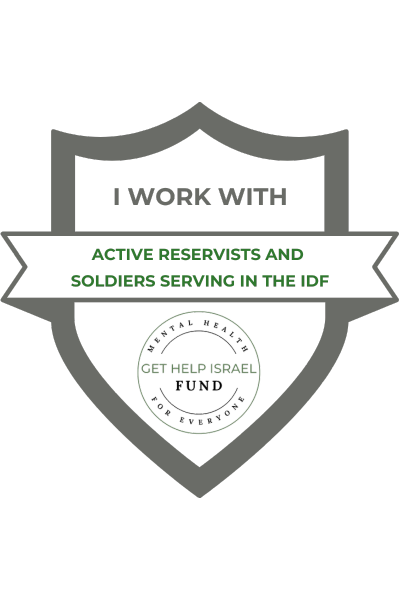Credentials
Finances
Licensed in Israel
Licensed Abroad
- German Colony
- Jerusalem
- Nayot
- Jerusalem
Elisheva Bellin
 Verified
Verified
Credentials
Clinical Psychologist
MA, PhD
Finances
350-500 NIS
None
Sliding Scale | Lone Soldier Discount
- German Colony
- Jerusalem
- Nayot
- Jerusalem
ABOUT THE THERAPIST
I am a clinical psychologist, licensed in New York and Israel, with experience treating adults, couples, and families. I have developed my clinical expertise through working in a wide variety of settings ranging from psychiatric hospitals, major medical centers, mental health clinics, veteran’s hospitals, and college counseling centers. As a psychologist with vast research experience, including a Fulbright fellowship, I draw from research to best treat my clients. My therapeutic approach is first and foremost empathic, compassionate, and genuine. I strive to foster a warm, supportive, and judgement-free environment to help my clients reflect on their struggles and bring about change. Feeling respected, safe, and understood in treatment is necessary to begin the journey, and I aspire to create that space for each client. I view each client holistically, helping to identify areas of difficulty and helping them to access strengths. I believe that it is important to assess the ways in which worries, stressors, or symptoms affect functioning at work, school, home, physical health, and relationships. I strive to help my clients bolster internal strengths and help access their resiliency to cope with the challenges they face. My therapeutic style is integrative, working collaboratively with my clients to tailor and incorporate treatment approaches to their specific needs and goals.
In therapy, I find it valuable to explore the early roots of my client’s difficulties and stressors and think together about the ways these earlier experiences have affected their development of self, their current struggles, and their relationships. I also help my clients recognize behavior and thought patterns that interfere with everyday life, and ways in which they can learn skills to cope with and help manage stressors. I work with individuals and couples facing a multitude of life difficulties including depression, grief/loss, anxiety, life transitions, adjustment to medical problems, acculturation struggles, stress management, relationship difficulty, self-esteem issues, marital/premarital counseling, and family conflict. I have a special interest in trauma and posttraumatic growth, helping traumatized individuals move forward and grow from their experiences while managing lingering distress. I am also dedicated to working with veterans and their families, having treated veterans on PTSD residential units, substance use programs, and outpatient PTSD clinics. If you would like to talk more about how we could work together, I welcome you to contact me for a consultation.
QUALIFICATIONS
PhD, MA
Long Island University
MA - 2013; PhD - 2018
Degree
PhD, MAEducation
Long Island UniversityYear of Graduation
MA - 2013; PhD - 2018Years in Practice
11
REGISTERED PSYCHOLOGIST IN ISRAEL
Registration in Pinkas Hapsichologim
27-157906
Mumche Category
Clinical Psychologist
Mumche License Number
27-40414
LICENSED ABROAD
License Number
023446/New YorkADDITIONAL CREDENTIALS
Barnard College of Columbia University, B.A.
Long Island University, M.A.
Long Island University, Ph.D.
DISTANCE COUNSELING
Online Therapy
PRIMARY SPECIALTIES
Postpartum Depression
Trauma / Post Traumatic Stress Disorder PTSD
ADDITIONAL SPECIALTIES
Adjustments
Anger Management
Anxiety / Panic
Bipolar Disorder
Couples / Relationship / Marriage Counseling
Depression
Grief
Life Transitions
Mood Disorders
Personality Disorders
Self-Esteem
Stress Management
CLIENT FOCUS
Population
Adults
Couples
Men
Women
Geriatric
Languages Spoken
Hebrew
English
TREATMENT APPROACH
Acceptance and Commitment Therapy (ACT)Acceptance and Commitment Therapy (ACT) is a form of psychotherapy that encourages individuals to accept their thoughts, feelings, and experiences without judgment and to use them as tools to help them to make changes in their lives that are consistent with their values. It is based on the idea that by changing the way we think about our inner experiences, we can reduce emotional distress and increase our sense of well-being.
Cognitive Behavioral Therapy (CBT)Cognitive Behavioral Therapy (CBT) is a type of psychotherapy that focuses on how one's thoughts, feelings and behaviors are connected and can be changed. It is based on the idea that how we think (cognition) and how we feel (emotion) can influence how we behave. CBT helps people identify and challenge distorted thinking and replace it with more balanced thinking, leading to improved mood and behavior. ‘Homework’, usually containing practical writing exercises, is often completed by the client between sessions to reinforce the therapy. Examples of tools that practitioners often use are journaling, challenging beliefs, and mindfulness.
Cognitive Processing TherapyCognitive Processing Therapy is used to treat trauma and PTSD. During therapy, clients identify and understand their beliefs about their responses to their trauma. Inspecting their beliefs often leads clients to understand their emotions and thoughts in relation to the trauma. When the client is ready, practitioners give them tools to challenge their thoughts of the trauma as well as provide homework to solidify what they learned in sessions. In the later stages of therapy, practitioners teach clients how belief systems (about safety, self-esteem, trust, intimate relationships, control, and power) can change after trauma.
Dialectical Behavior Therapy (DBT)Dialectical Behavior Therapy (DBT) is a type of cognitive-behavioral therapy developed by Marsha Linehan to help people learn to better manage and cope with emotions and stress. It focuses on developing skills and strategies to help regulate emotions, improve relationships and communication, and reduce self-destructive behaviors. Through DBT, people learn to identify and modify unhealthy thoughts and behaviors, while also learning to accept and validate their own feelings. DBT teaches skills to help individuals become aware of and accept and regulate their emotions, tolerate distress, and improve interpersonal relationships.
Emotion-Focused TherapyEmotion-focused therapy (EFT) is a type of psychotherapy that is based on the idea that emotions play a key role in a person’s mental health. EFT focuses on helping people to identify, accept, and manage their emotions in a healthy and productive way. The goal of EFT is to help people identify and express their emotions, understand how those emotions impact their behavior, and learn how to manage their emotions in a way that is adaptive and healthy. EFT is a research-based approach to psychotherapy that has been found to be effective in helping people manage a variety of mental health conditions. It has been used successfully in the treatment of individuals, couples, and families, as well as with groups. EFT is particularly beneficial for people who struggle with emotional regulation, mood disorders, anxiety, trauma, and relationship issues.
Interpersonal Psychotherapy (IPT)IPT focuses on the relationships and interactions an individual has with others. It is based on the premise that the way that we interact with others can have a significant impact on our emotional well-being. During IPT sessions, the practitioner will work with the client to identify patterns of behavior and communication that may be contributing to their emotional distress. They will then help the client learn new ways of interacting with others, as well as teach them coping skills to manage difficult emotions. It is a time-limited therapy, typically lasting between 12-16 weeks, with the goal of helping the client develop long-term coping skills.
Psychodynamic TherapyPsychodynamic therapy is a form of therapy that focuses on the unconscious mind and how it affects behavior. It works to help people understand and work through past experiences and feelings that may be causing difficulties in the present. This type of therapy encourages individuals to explore their emotions, relationships, and behaviors in order to gain insight into their current difficulties. It can help individuals better understand themselves and their motivations, and gain insight into how past events have impacted their current lives. People tend to develop defense mechanisms when faced with challenges in life. Defense mechanisms may keep painful feelings, memories, and experiences in the unconscious. A few common defense mechanisms include: denial, repression, and rationalization. Psychodynamic therapists encourage people to speak freely about their emotions, desires, and fears. Being open may help uncover vulnerable feelings that have been pushed out of conscious awareness. According to psychodynamic theory, behavior is influenced by unconscious thought. Once painful feelings are brought forth and processed, the defense mechanisms are no longer needed and a person in treatment can start changing unhelpful patterns when coping with life’s challenges.
Relational PsychotherapyRelational psychotherapy is a form of psychotherapy that focuses on a person’s relationships with others and the dynamics between them. It emphasizes the importance of the therapeutic relationship between the client and the therapist, and it explores the meaning and purpose of relationships in the client’s life. Relational psychotherapy seeks to understand how the client’s past relationships shape their current experiences and how the client interacts with others. The goal is to help the person develop healthier relationships and better communication skills so they can become more emotionally connected to others.
SERVICES OFFERED
Individual Therapy
Consultation
Couples Therapy
Family Therapy


 Verified
Verified



